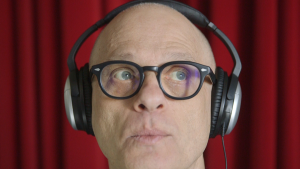David Lang: Vanguard of the Un-Cool
Description
Pulitzer Prize-winning composer David Lang is now a darling of avant-garde classical music, but he’ll always think like an outsider.
Featured Artists

David Lang is an innovative composer and a co-founder of music collective Bang on a Can. He won the Pulitzer Prize for Music in 2008 for his choral work The Little Match Girl Passion.
Born in 1959 in Los Angeles, Lang studied at Stanford University and the University of Iowa before earning a PhD in musical arts at Yale School of Music. He formed Bang on a Can in 1987 with fellow Yale students Michael Gordon and Julia Wolfe. The organization is best known for its Marathon Concerts—informal daylong presentations of contemporary classical music.
Lang has composed for opera, theater, film, and choral groups. He wrote the score for feature films (Untitled) (2002) and Wildlife (2018), among others, and was nominated for an Academy Award for Youth (2015). A recording of his Pulitzer-winning work The Little Match Girl Passion, based on a story by Hans Cristian Anderson, won a Grammy Award in 2010. His opera Prisoner of the State was commissioned by the New York Philharmonic in 2019.
He teaches composition at Yale School of Music.
Transcript
Brilliant though he may be, the Pulitzer Prize-winning composer David Lang is not, nor has he ever been, on the vanguard of cool.
David Lang: My entire life I have been the weirdo. I am the biggest nerd in the world.
Ever the individual Lang’s ability to write music stems from a desire to access the forbidden and explore the uncharted.
Lang: As soon as you tell me that I can’t have pleasure all the time, it’s all I want. And I think in a piece of music, those are the kinds of things that can spur you on. If someone tells me that something is not possible then all of a sudden, I start thinking, well, how can I make that possible?
Over the past 40 years, David Lang has been not only challenging but downright ignoring boundaries in his own compositions and as part of the contemporary classical music group, Bang on a Can. Formed in New York City in 1987 with fellow avant-garde composers Julia Wolfe and Michael Gordon, Bang on a Can was created to transcend the confines of classical music, to be a refuge from genre distinctions, and, lovingly, a home for weirdos.
Lang: The weirdo thing is like this. Again, when you’re a student you see what kinds of boxes there are in the music world and the institutions are built around you to reward the people who fit squarely in a box and to ignore or punish or discard the people who don’t fit squarely in that box. So for us one of the great thrills was thinking, we can actually build this platform where people who are not easy fits can fit.
Bang on a Can is attempting to create an inclusive, innovative world that they want to live in by giving mold breakers opportunities to be themselves. These efforts include an elite ensemble called The Bang on a Can All-Stars, a prestigious annual music marathon and their summer festival at MASS MoCA in Western Massachusetts. But Lang has also thrived beyond Bang on a Can, yet even when working alone, he strives for connection. Take, for instance, his 2008 Pulitzer Prize-winning composition, “Little Match Girl Passion.” The piece is based on the Hans Christian Andersen tale of a poor girl whose family sends her into the cold to sell matches on New Year’s Eve. She’s neglected by everyone who passes by and spends the night in an alley trying to warm her body and her spirit with the matches, until she dies of hypothermia and is welcomed into Heaven by the image of her grandmother. Writing it, says Lang, was an exercise in empathy.
Lang: In order to make a story like that work I have to be the girl, and I have to be the most cold-hearted person who ignores the girl. It seems to me that one of the things about Christianity which is so powerful is that it says to you, if you notice this one man’s suffering, it can change our world. That’s a very beautiful idea, and yet I walk around in New York, as do all New Yorkers, ignoring suffering right and left, so I wondered, can I use a piece of music to feel how I actually feel about this? How do I feel as a citizen of my world having to ignore these people?
Never one to shy away from the morose, Lang wrote Death Speaks for composer and vocalist Shara Worden, a piece that personifies death as a living character. But Lang says he’s drawn to dark subjects not as a way to indulge sadness, but as an opportunity to examine things he doesn’t understand.
Lang: A piece of music is a great place to explore the things that you’re curious about or the things that you’re afraid of, or the things that you can’t put your finger on. It’s not a good place to do a mathematical proof or to say something completely secure and provable. It’s a good place to deal with questions you can’t answer. When I go into my studio, all I am trying to do is figure out how to please myself, how to examine myself.
For David Lang, music is one of life’s great gateways to truth, especially when it’s weird.
Lang: When you are a composer you spend a lot of time by yourself, and that can be one of the most psychically damaging things. But it’s also one of the great gifts, is that if you use these pieces to figure out who you are and what you believe, you can dedicate a huge amount of energy to really trying to figure out what’s true.

